
Dental abscess is a common oral disease due to many different causes. Whether a dental abscess is dangerous or not depends on the progression of the disease. In the early stages, this disease is often very difficult to detect, but if treated promptly at this time, it will not cause any effects on overall health. On the contrary, if the disease progresses too severely, it can make chewing difficult and health significantly reduced.
1. What is a dental abscess?
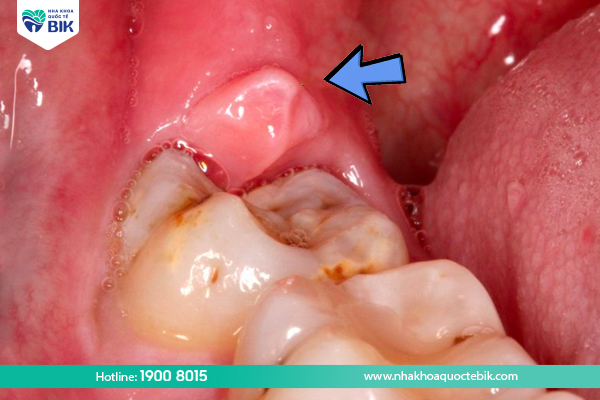
Periapical abscess is an infection that occurs at the tooth root. When the gum tissue is damaged and inflamed, bacteria will tend to invade and attack deep inside. At this time, white blood cells will be produced to protect the body from that attack. After that, pus will begin to appear at the tooth root, which is the body of white blood cells and bacteria mixed with body fluids.
The pus cannot escape and will form abscesses at the tooth root. Abscesses are formed very quickly, within just one or two days from when the gums show signs of inflammation. Periapical abscesses can occur in all subjects, including children and adults.
2. Signs of tooth abscess
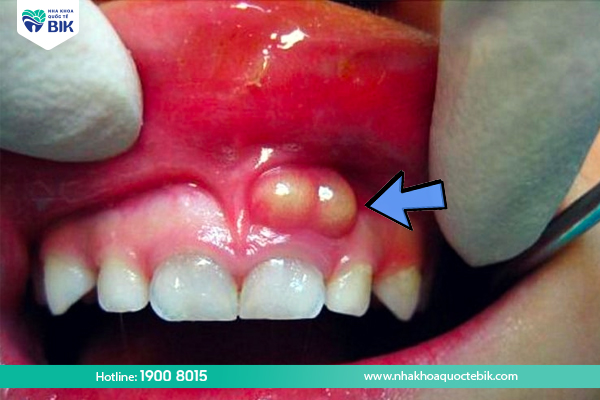
The more pus accumulates in the abscess, the greater the pressure will be, compressing the nerves and surrounding soft tissues. Therefore, one of the most easily recognizable signs of this condition is severe pain, or a feeling of tooth sensitivity when eating food that is too hot or too cold.
In addition, the gum tissue at the tooth root is infected, so there will be signs of swelling. Not only that, the lymph nodes under the jaw are also swollen and this condition can spread to the neck and cheeks.
In addition, the breath also has an unpleasant odor due to H2S gas produced by bacteria living in abscesses. The body also shows additional symptoms related to infection such as: High fever, dizziness, chills, fatigue, …
3. Causes of tooth abscess
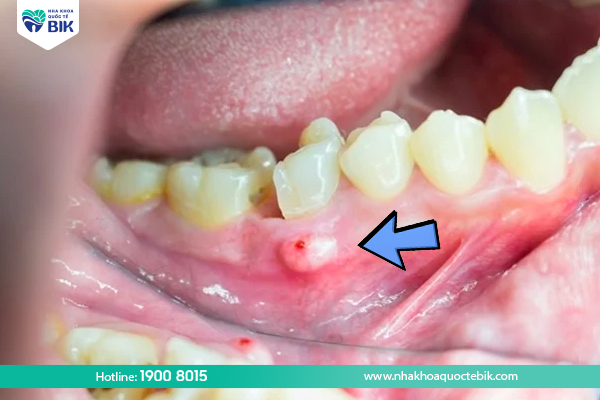
Tooth abscess can be caused by the following reasons:
– Improper oral hygiene makes the oral cavity unclean, over time food plaque will accumulate and create a favorable environment for bacteria to grow and develop.
– Due to severe periodontal disease.
– Due to failed root canal treatment.
– Due to severe trauma, strong impact or trauma that causes the tooth to crack and cause the tooth abscess to progress faster.
– Due to the patient not actively treating tooth decay or pulpitis, but letting the condition persist.
– People with diabetes, cardiovascular disease or other chronic diseases often have a weakened immune system. Taking advantage of this opportunity, bacteria will quickly attack the body, causing a tooth abscess.
4. Is a tooth abscess dangerous?
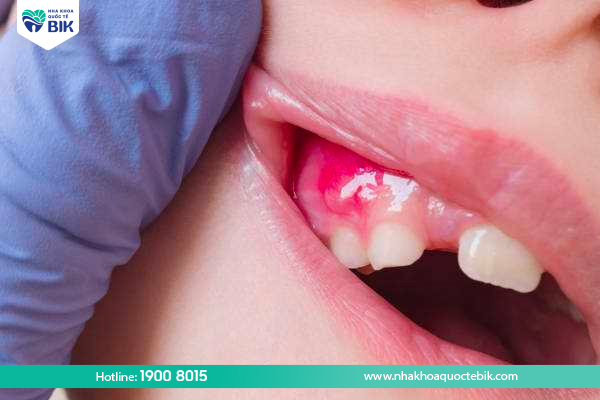
If a dental abscess is detected early and treated promptly, it will not lead to any dangerous complications. On the contrary, if the disease progresses for a long time without taking any remedial measures, health will be greatly affected.
In fact, dental abscess will change back and forth between acute and chronic, so the patient cannot control the stage of the disease. Therefore, many people are subjective and often only use painkillers to feel more comfortable. However, this method is very dangerous because the patient thinks that the disease is cured when he does not feel any symptoms, while the disease silently progresses very complicatedly and becomes more and more severe.
First, when suffering from a dental abscess, the tooth will definitely ache or even become loose, making it difficult to eat and chew every day. Over time, the patient may no longer want to eat or drink anything, the body is not fully supplemented with necessary nutrients, causing health to decline more and more. In addition, the teeth will gradually become weaker and have a very high risk of breaking and falling out.
In addition, the maxillary sinus can be infected or brain abscess is also one of the unpredictable complications caused by tooth abscess. Through the blood vessels, bacteria will enter and attack the brain and lead to coma, more dangerous is the life-threatening condition of sepsis.
5. Effective treatment of tooth abscess
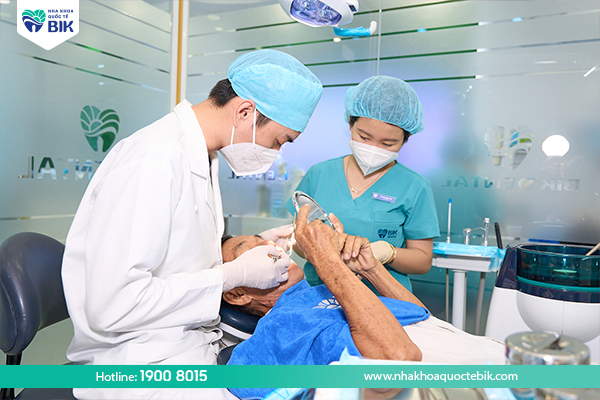
To know the exact treatment method, the doctor needs to perform a detailed examination to know the specific infection status as well as the progression of the disease. Depending on each case, the doctor will prescribe the appropriate treatment, but the general principle is to remove the abscess, control symptoms and preserve the tooth as much as possible.
5.1. Pain relief at home
Before going to the dentist, you can apply pain relief measures at home to feel more comfortable:
– Rinse your mouth with saline after eating to remove bacteria and plaque to keep your mouth clean.
– Apply a warm tea bag to the outside of the infected tooth root area to reduce pain.
– Use over-the-counter pain relievers in certain doses such as: Acetaminophen, Ibuprofen, …
However, all of the above measures only have a temporary pain relief effect and do not completely cure the tooth abscess. Therefore, you need to see a doctor as soon as possible for immediate treatment.
5.2. Treatment in the acute phase
At this stage, the doctor will remove the abscess pus to avoid severe inflammation affecting the surrounding tissues. A small tooth extraction procedure will be performed to drain the fluid, clean the pathogenic bacteria at the abscess site combined with the use of antibiotics to kill the pathogenic bacteria, preventing the abscess from becoming complicated. The doctor may prescribe other medications to reduce symptoms such as pain relievers, antibiotics, vitamins, etc. for each specific case.
5.3. Radical treatment
After draining the pus, the symptoms have gradually subsided, but the patient still needs to continue treatment to avoid recurrent infection. Depending on each specific case, the doctor will prescribe root canal treatment, scaling, debris removal, etc. However, for cases where the abscess is too severe to be treated conservatively, the doctor will have to remove the tooth at the abscess site.
After treating a tooth abscess, you need to pay attention to a full diet, supplementing with plenty of water, vitamins and minerals. In addition, you should not let your mouth get dry and limit hard, chewy, hot, cold foods, etc.
6. Preventing tooth abscess
To prevent oral diseases in general and tooth abscess in particular, you should note the following:
– Brush your teeth at least twice a day, especially 30 minutes after eating to keep your mouth clean and free of leftover food particles.
– Visit and have your teeth cleaned periodically at least twice a year to promptly detect oral diseases and treat them immediately.
– Supplement all necessary vitamins and minerals in your daily menu. Limit the use of foods and drinks that are harmful to your teeth such as cakes, coffee, candy, etc.
– Stay away from cigarettes, alcohol and some other stimulants.
So whether a tooth abscess is dangerous or not depends on the stage of development of the disease. If the abscess has just formed and is treated immediately, it will not cause any effects on health. Note that this is a very complicated dental technique, so you should choose to be treated at a reputable dental facility to ensure the treatment process is safe and brings the best results.


















